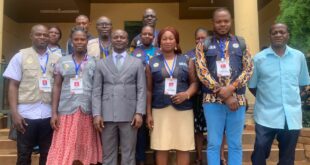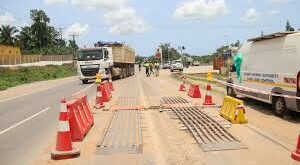Funmi Dele-Giwa
Being deliberate about creating a “greater purpose” is essential to building an authentic corporate culture, engaging stakeholders, and navigating the evolving landscape of corporate philanthropy. This is the philosophy behind Africa’s largest digital payments network, Onafriq’s, extensive growth and vision to unify the continent’s digital payments landscape according to its General Counsel and Chief Risk Officer Funmi Dele-Giwa.
Dele-Giwa recently shared insights into the organisation’s unique position at the intersection of social impact and commercial ambition at the Women in Payments Symposium EMEA, held in London. During her speech she delved into the company’s journey in delivering greater financial access and connecting all of Africa into a single integrated network that empowers both individuals and businesses.
“The purpose of Onafriq from the very onset was one of providing financial access to marginalised individuals on the African continent and having a positive impact in the countries we operate in and the clients we serve,” she said. “That is why Onafriq was built on the back of a strong belief that mobile money would serve as a strong enabler of financial access to millions of under- or unserved Africans.”
Established nearly 15 years ago with the mantra of “making borders matter less”, the company aims to facilitate cross-border payment services within Africa – as well as in and out of Africa. This is underpinned by the vision of its Founder and CEO Dare Okoudjou, that making a payment anywhere in the world, to anywhere across the globe should be as easy and as painless as it is to make a phone call.
Today, Onafriq’s payments network connects more than 1,300 cross-border payment corridors providing access to more than 500 million mobile wallets and 200 million bank accounts across 40 African markets. This vast digital infrastructure is a testament to its position as the “network of networks”, enabling services like cross-border payments, remittances, card issuing, agency banking and more, which facilitate seamless money flow from, to, and across the continent.
During her talk at the symposium, Dele-Giwa noted that remittance services were a key example of this marriage of concepts, having particularly emerged as a powerful tool for boosting economic growth and financial empowerment. By partnering with international remittance companies, the Onafriq network enables the significant pool of migrant workers from Africa in the diaspora to send and receive money efficiently and affordably. She notes however, that remittances are not just the privy of the global north to south, as there is significant intra-Africa remittance demand which has traditionally remained unmet. Through partnerships with mobile network operators (MNOs) across the Continent, Onafriq is bridging gaps between countries like Kenya and Uganda, as well as Cameroon and Nigeria, by digitising and facilitating intra-Africa remittance flows.
“Strategic collaborations between key sectors of Africa’s financial services landscape are key to unlocking the full potential of remittances as a catalyst for economic growth and development,” said Dele-Giwa. “As such, fostering robust partnerships between payment networks and mobile money platforms is important to enabling greater remittance flows given the widespread adoption of mobile wallets across the continent.”
Another way that Onafriq is blending the principles of social betterment with business objectives is by empowering small businesses in Africa to flourish and grow by enabling access to a wider range of choices in disbursing or collecting digital payments over cash. Onafriq’s partnership with One Acre Fund is an example of how the company’s network has contributed to providing small-scale farmers with asset-based financing services.
“Our work to open up markets and connect people to opportunities continues to empower the African gig economy, enabling GDOs to deliver cash assistance to needy communities and international merchants to pay local creators, influencers and artists, as well as helping small traders to sell their goods across borders, by simplifying the ways they can pay and can get paid,” said Dele-Giwa.
Another notable aspect of Onafriq’s journey of positive social impact, according to Dele-Giwa, is its commitment to empowering women. Through its agent network in Nigeria, women entrepreneurs are able to generate additional income by becoming agents, and by using the Baxi point of sale device they can easily manage payments for their shops and market stalls. Furthermore, partnerships with organisations like the One Acre Fund helped to empower women in small-scale farming, amplifying their economic participation.
For those seeking to emulate Onafriq’s success, Dele-Giwa noted that it was important to align their social mission with the innovation and collaboration needed to achieve a positive impact while pursuing commercial success.
“Let’s remember, it’s not just about the services we offer. It’s about the impact we make while doing so,” she said. “It’s important to share those impactful stories of empowerment and positive change delivered as a result of your products and services, but it is also important to create a set of impact metrics to measure success by. This way you are always able to hold yourself accountable to employees, shareholders, regulators, clients, and other stakeholders.”
 Home Of Ghana News Ghana News, Entertainment And More
Home Of Ghana News Ghana News, Entertainment And More





